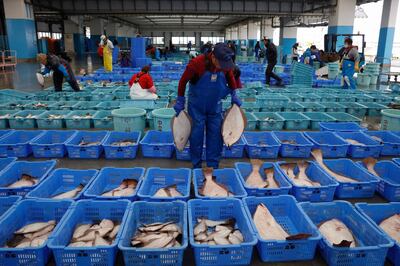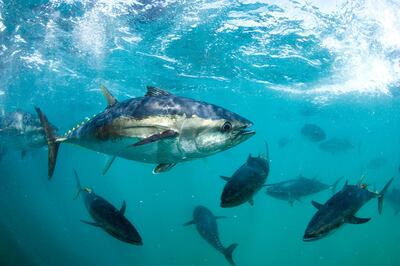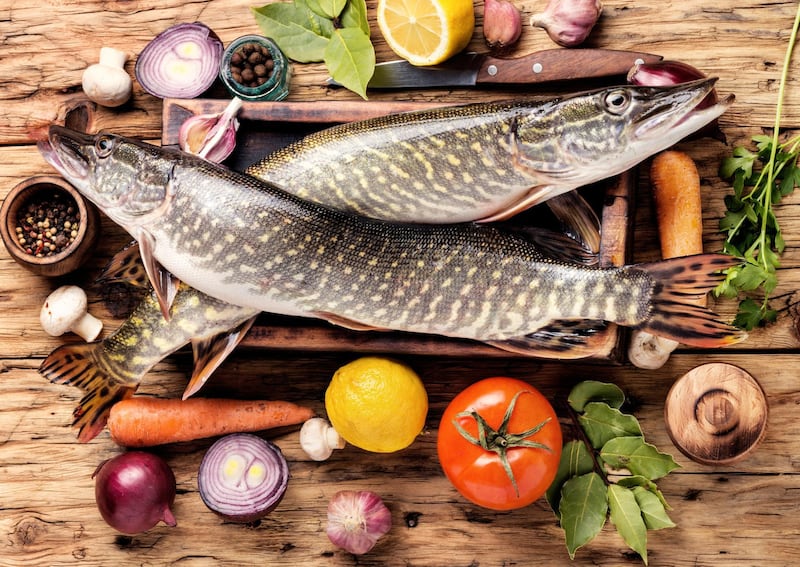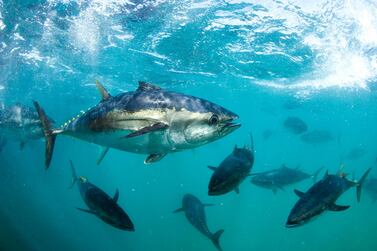Meat-free is definitely not only for Mondays any more. Nowadays, it's everywhere – and it's seven days a week. Coconut lattes, black bean burgers, egg-free omelettes – the plant-based revolution is like a tidal wave, washing over the planet and changing the face of every supermarket, cafe and restaurant in its path.
Last year, British supermarket chain Waitrose released a report that found 30 per cent of people have either reduced their consumption of meat or removed it entirely from their diet. The trend was present across all age groups.
One of the side effects of this movement is the increase in pescatarians – people who eschew meat but who still eat dairy, eggs, fish and other types of seafood. For the vast swathes of us striving to become more plant-based, fish seems to be the last protein with a heartbeat we can stomach.
Doaa Mohamed Refaat, 30, an Egyptian living in Dubai, has been pescatarian since 2016. “I started turning towards a vegetarian diet, but I found I couldn’t leave fish out,” she says. “I wasn’t comfortable with how meat was produced and, when travelling, I was worried it wouldn’t be halal. In that sense, fish is a safe choice for me.”
For Doaa and many others like her, health is a big factor in quitting meat. "I wasn't feeling healthy. I had no energy, I had bad skin and regular tummy aches," she says. "I knew my diet was wrong. I started to take notice of which food made me uncomfortable and reading about the hormones in chicken and meats.
“I moved to being pescatarian and began eating a lot more vegetables, too. I don’t have even half of the negative consequences of eating meat. I feel fresher and lighter, my skin is clearer, my energy levels better and I have no discomfort after eating.”
It's a well-known fact that too much red meat can cause a wide variety of health issues. The World Health Organisation has been flying the banner against processed meats for many years now, reporting back in 2015 that 50 grams of the stuff per day can increase your chances of colon cancer by 18 per cent. More recently, a study published in the medical journal JAMA Internal Medicine found that while vegetarians had a 22 per cent lower risk of colorectal cancer than meat eaters, pescatarians had a whopping 43 per cent lower risk – possibly because of the omega-3 fatty acids in fish, say the authors.
Another study, which was recently published in the British Medical Journal, followed 48,000 people for an average of 18 years and found that while pescatarians and vegetarians both have lower rates of coronary heart disease than carnivores, vegetarians have higher rates of stroke. Researchers believe this could be because vegetarians may have very low levels of cholesterol, while fish eaters are likely to have healthier levels, plus plenty of vitamin B12. These statistics all support recommendations in the Journal of the American Heart Association that eating non-fried seafood (especially those higher in healthy fatty acids) once or twice a week has strong cardiovascular benefits.

But what about the mercury levels? Nutrition experts at Harvard University say the main health concerns surrounding seafood consumption are the levels of pollutants, such as mercury, polychlorinated biphenyls (PCBs), dioxins and pesticide residues. High levels of mercury can cause nerve damage in adults and children and can be dangerous during pregnancy. But they also note that mercury levels found in fish are nowhere near as high as we may think and have been linked with only subtle changes in the nervous system and a possible increase in risk of cardiovascular disease. The experts cited a study that predicted if 100,000 people ate farmed salmon twice a week for 70 years, the PCB intake could cause 24 extra deaths from cancer, but the dietary addition would prevent 7,000 deaths from heart disease. Additionally, 90 per cent of PCBs and dioxins in our diet come from meats, dairy and vegetables, the experts added.
So fish can be healthy for us, but then there is matter of the environment. There is no ignoring the fact that the meat industry is not sustainable, but what about fishing? Kaitlynn Simmonds, 29, from Hawaii, initially stopped eating meat after hearing horror stories about the industry.
“I care about animals – and also about my own health. I never liked the way meat made me feel,” she says. “When I heard about how many animals are killed each year to feed us and how they are treated, it really bothered me. So, I started researching how I could replace meat in my diet.”
Simmonds quickly became pescatarian, but now, four years later, has decided to move over to a vegetarian diet, with the goal of becoming fully vegan in the future. “I was happy being pescatarian. Growing up in Hawaii, we ate a lot of fish and I didn’t have any intention of going vegetarian, or vegan,” she says. “But when I got involved with Azraq, a local marine conservation organisation, helping out with some of their campaigns, they opened my eyes to some of the bigger issues such as how commercial fishing hurts the oceans. It hit me hard as I love the water and I love these animals. It helped me make the choice to become vegetarian.”
Simmonds learnt that when it comes to sustainable eating, not all seafood is created equally and consumers need to make discerning choices if their goal is to lessen their personal impact on the planet. While we won't all be going plant-based, if your goal is to lower your carbon footprint, it's not enough to simply swap your Big Mac for a Filet-O-Fish, or your Australian steak for a Norwegian salmon. In the same way you have the choice to buy chickens raised in battery cages and pumped full of chemicals, or free-range from farms that don't use hormones, there are also choices to be made when consuming fish and seafood. These choices may carry a financial implication, but, in the battle against the poor practices of mass food production, paying a little bit extra for ethically sourced, nutrient-rich food can help to turn the tide by creating demand for good-quality, well-produced, environmentally friendly products.

Sean Dennis, chief executive and co-founder of Seafood Souq, a regional online marketplace focused on delivering fresh seafood to UAE businesses, says making good choices begins by knowing where your products are coming from.
"With farmed fish, we have seen incredible progress, particularly in this region, with organic products reaching the market carrying limited environmental impact due to being locally sourced," he says. "If we are consuming fish from the ocean, we need to make sure that the supply isn't being overfished and that the correct size and age of fish are being caught so it doesn't injure the population of that fish and to ensure the long-term survival of that species." That means avoiding severely overfished species such as hammour and sheri.
Farmed fish isn't what it used to be, either. While the farms have traditionally had a bad rap because of high levels of hormones, antibiotics and chemicals being used, these days these facilities have upped their game in creating positive environments for fish to breed and grow into happy, healthy creatures – without a need for chemicals.
"Good suppliers are keen to share their story and their environmental practices," Dennis continues. "This is great, as it means that it's easier for us as consumers to make an educated choice – all of this alters the taste and the quality of what you are consuming. If you were buying a steak, often you would be able to find out where it was from and the story behind the meat. There isn't always that same story with seafood, but there should be."
Whether pescatarianism is your end goal or a stepping stone on your journey to becoming fully plant-based, there are a vast range of benefits to be found – provided you consume ethically. The reality is that when it comes to making a difference to our health and that of our planet, the strongest vote we have is with our forks.












